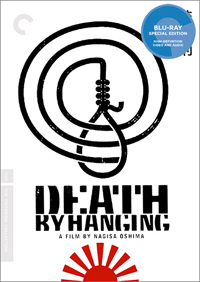 Before he would come to be known as one of cinema’s most controversial provocateurs with his most infamous title, 1976’s In the Realm of the Senses, Nagisa Oshima was heralded as one of the most influential voices in the Japanese New Wave of the 1960s. The decade prior showed the director contemplating urban youth issues, showcasing the moral quandaries of a new, disenchanted generation struggling to define notions of identity in Post WWII Japan. In the early 60s, Oshima spent most of his time working in television before returning to features predicated on lurid social issues usually involving a fascinating mixture of sexuality and crime. But 1968 saw the auteur tackling the treatment of Korean immigrants in Japan in two striking portraits, Three Resurrected Drunkards and the dark comedy Death by Hanging.
Before he would come to be known as one of cinema’s most controversial provocateurs with his most infamous title, 1976’s In the Realm of the Senses, Nagisa Oshima was heralded as one of the most influential voices in the Japanese New Wave of the 1960s. The decade prior showed the director contemplating urban youth issues, showcasing the moral quandaries of a new, disenchanted generation struggling to define notions of identity in Post WWII Japan. In the early 60s, Oshima spent most of his time working in television before returning to features predicated on lurid social issues usually involving a fascinating mixture of sexuality and crime. But 1968 saw the auteur tackling the treatment of Korean immigrants in Japan in two striking portraits, Three Resurrected Drunkards and the dark comedy Death by Hanging.
Based on an actual criminal case from a decade prior concerning a Korean immigrant who murdered two Japanese girls, Hanging plays like an odd, exaggerated inverse of his 1966 title, Violence at Noon, wherein two women are forced to reckon with a man they know to be a murdering rapist. Co-written by regular Oshima scribes of the period, Mamoru Sasaki and Tsutotomu Tamura (Sing a Song of Sex, 1967; The Ceremony, 1971) and Michinori Fukao, the film is a perverse comedy modeled garishly on Kafka. As R. (Yu Do-yun) is about to hang by the neck for murder, Oshima himself narrates the set-up, directly preceding the opening title statistics concerning public opinion on the death penalty. R somehow survives the execution and the flabbergasted authorities find themselves in a moral quandary as to whether hang him again or make him confess his crimes once more in order to elicit shame and ensure understanding. Unfortunately, R now suffers from amnesia, unable to recall who he is or what crimes he’s been charged with. In an effort to make him recall it, the police engage in a ludicrous plan to reenact R’s home life and the eventual murder, filling in the missing details as they see fit.
As Death by Hanging dips into a grotesque critique of social practices, Oshima divorces the narrative from broad commentary to suggest the actualization of crime as made possible through sheer, collective will. Is R actually guilty or do the police simply desire him to be? Why does he have to be shamed into feeling guilty to justify his execution? These are the more compelling questions Oshima poses in what’s one of his more sobering depictions. However, the auteur’s customary bluntness is still intact, especially as regards direct discussions of the perpetrator’s ‘actions,’ including rape transpiring from the specter of sexual deviancy (i.e., masturbation).
The madness descends into broad comedy, particularly Fumio Watanabe as the hysterical education officer, here an over-the-top staple one would expect from Oshima. In this social universe, these men are defined by their occupational title, and nothing more, an unattainable prestige for the disrespected Korean immigrants. Oshima includes pointed instances of racist stereotypes attributed to the Korean population, which eventually becomes more macabre when R actually begins to respond and engage with the suggested reenactments.
Disc Review:
Criterion has restored several of Nagisa Oshima’s most notable films (this will be his fourth entry into the collection, plus a delectable Eclipse box set of several other 1960s titles), and it’s a delight to see a continued resuscitation of more obscure works. This new 4K digital restoration features an uncompressed monaural soundtrack. The second of eight collaborations between Oshima and DP Yasuhiro Yoshioka, the film begins like a moderate docu-hybrid, taking place in one claustrophobic space until suddenly bursting out of doors, the frame expanding to wide, open rooftops.
Tony Rayns:
Asian film critic Tony Rayns discusses the continued social relevance of Death by Hanging in this thirty minute segment, claiming Oshima’s films tend to be a reaction against the previous film he’d just made, each taking on a form distinctly different from any other.
Diary of Yunbogi:
An experimental 1965 documentary from Oshima, Diary of Yunbogi, finds the director exploring Japanese-Korean relations via this portrait of an impoverished South Korean boy. A twenty-four minute short, the stark, black and white piece is narrated by the young boy, describing his poor living conditions amidst a flurry of dreary photos depicting the slums inhabited by immigrants.
Final Thoughts:
Morbidly amusing, Death by Hanging features many of Oshima’s signature flourishes, and is a fascinating mixture of social issue drama and surreal black comedy.
Film Review: ★★★½/☆☆☆☆☆
Disc Review: ★★★★/☆☆☆☆☆


